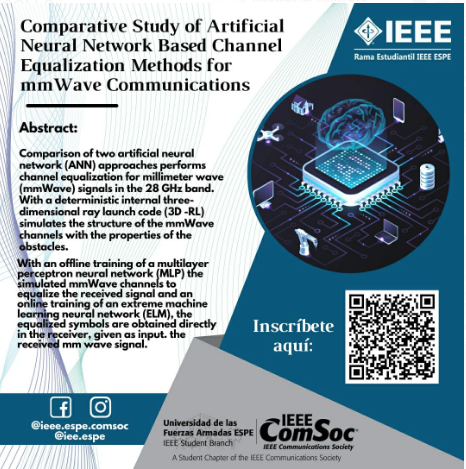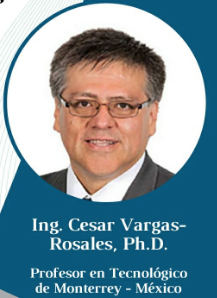Comparative Study of Artificial Neural Network Based Channel Equalization Methods for mmWave Communications

El capítulo profesional IEEE ComSoc Ecuador en coordinación con el capítulo estudiantil de la Universidad de las Fuerzas Armadas - ESPE, se complace en presentar al Dr. Cesar Vargas-Rosales, Distinguished Lecturer de ComSoc, con su charla denominada "Comparative Study of Artificial Neural Network Based Channel Equalization Methods for mmWave Communications".
Date and Time
Location
Hosts
Registration
-
 Add Event to Calendar
Add Event to Calendar
Loading virtual attendance info...
Speakers
 Cesar Vargas-Rosales of Tecnologico de Monterrey
Cesar Vargas-Rosales of Tecnologico de Monterrey
Comparative Study of Artificial Neural Network Based Channel Equalization Methods for mmWave Communications
In this conference, we compare two artificial neural networks (ANNs) approaches designed to perform channel equalization for millimeter-wave (mmWave) signals operating in the 28 GHz frequency band. We used an in-house deterministic Three-Dimensional Ray-Launching (3D-RL) code to simulate the spatial structure of mmWave channels considering the material properties of the obstacles within the scenario at the frequency under analysis. We performed offline training of a multilayer perceptron (MLP) neural network with the simulated mmWave channels to equalize the received signal. We also performed online training of an extreme learning machine (ELM) neural network to directly get the equalized symbols at the receiver, given as input the received mmWave signal. The ANN solutions were tested in terms of the achievable spectral efficiency, bit error rate, and time to process. We compared the ANN techniques to the minimum mean square error and the zero-forcing equalizers, considering an orthogonal frequency-division multiplexing communication based on the 5G New Radio standard. We present numerical results on the performance of the proposed ANNs and show that the ELM strategy outperforms the MLP method, requiring significantly less processing time than the reviewed equalization methods.
Biography:
Cesar Vargas-Rosales is currently a professor at Tecnologico de Monterrey, in Monterrey Mexico, and the Leader of the Strategic Research Group on Telecommunications. He received the Ph.D. and M.Sc. degrees in Electrical Engineering with a major in Communications and Signal Processing, from the Department of Electrical and Computer Engineering at Louisiana State University, Baton Rouge, LA.
Dr. Vargas-Rosales is a member of the Mexican National Researchers System (SNI level II), the Academy of Engineering of Mexico (AIM) and the Mexican Academy of Sciences (AMC). He has been the IEEE Communications Society Monterrey Chapter Chair and the Faculty Advisor of the IEEE-HKN Lambda-Rho Chapter. He has also been the Technical Program Chair of the IEEE WCNC. He serves on several editorial boards and program committees of prestigious IEEE journals and conferences. His research interests are personal communications, 5G, cognitive radio, MIMO systems, stochastic modeling, intrusion/anomaly detection in networks, position location, interference, error correcting codes and reconfigurable networks.
Email:
Address:Monterrey, Mexico
Agenda
Lunes 2 de Agosto:
17:00 GMT-5: Ing. Cesar Vargas-Rosales Ph.D. - "Comparative Study of Artificial Neuronal Network Based Channel Equalization Methods for mmWave Communications"

